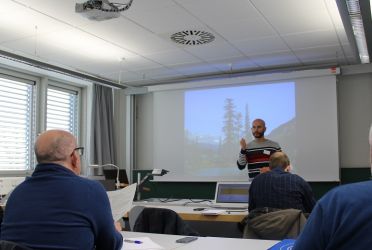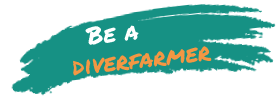The Diverfarming team have developed a handbook of indicators to assess the effects of crop diversification in soils and plants
What indicators reveal if an agricultural system is being sustainable? And, which methods would be the most reliable to measure them? A team made up of technical and research personnel, in collaboration with farming businesses, has published the Handbook of plant and soil analysis for agricultural systems, aiming to answer these questions. This publication thus becomes one of the first practical results of the Diverfarming project, financed by the European Commission Horizon 2020 programme, and centred on propagating crop diversification and the use of low-input farming practices as basic strategies for sustainable agriculture in Europe.
 After a year’s work which began with a workshop on sampling soils and plants, processing, pre-treatment and methodologies, in Trier (Germany), in January 2018, the scientific-technical team have reached a consensus on a list of indicators which are effective at determining the sustainability of farming systems by means of measuring the crop properties in situ and the soil in which they grow.
After a year’s work which began with a workshop on sampling soils and plants, processing, pre-treatment and methodologies, in Trier (Germany), in January 2018, the scientific-technical team have reached a consensus on a list of indicators which are effective at determining the sustainability of farming systems by means of measuring the crop properties in situ and the soil in which they grow.
Coordinated by three working sub-groups specialised in crop production and quality, the impact of the diversification on the biodiversity, and the environmental impact of diversification, the Diverfarming partners have developed a series of milestones from which a system can be known to be working or not. Specifically, the guide for farmers and agricultural managers proposes indicators for the production, the harvest quality, its nutritional composition, the incidence of pests and diseases, the soil fertility and quality, carbon sequestration, emissions of greenhouse gases and biodiversity. To achieve this, the Diverfarming team have selected the most appropriate methods of measuring them.
The handbook is divided into three main sections: i) plant and crop analyses, ii) soil physico-chemical analyses and iii) soil biological analysis, which gather together a total of 90 procedures to analyse the plant, harvest and soil. It is published by the Universidad Politécnica de Cartagena and is open access. Consult it here.
Diverfarming is a project financed by the Horizon 2020 Programme of the European Commission, within the challenge of “Food Security, Sustainable Agriculture and Forestry, Marine, Maritime and Inland Water Research and the Bioeconomy”, which counts on the participation of the Universities of Cartagena and Córdoba (Spain), Tuscia (Italy), Exeter and Portsmouth (United Kingdom), Wageningen (Netherlands), Trier (Germany), Pecs (Hungary) and ETH Zurich (Switzerland), the research centres Consiglio per la ricerca in agricoltura e l'analisi dell'economia agraria (Italy), the Consejo Superior de Investigaciones Científicas (Spain) and the Natural Resources Institute LUKE (Finland), the agrarian organisation ASAJA, and the companies Casalasco and Barilla (Italy), Arento, Disfrimur Logística and Industrias David (Spain), Nieuw Bromo Van Tilburg and Ekoboerdeij de Lingehof (Netherlands), Weingut Dr. Frey (Germany), Nedel-Market KFT and Gere (Hungary) and Paavolan Kotijuustola and Polven Juustola (Finland)).










